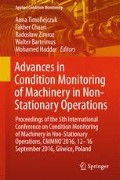Abstract
Advanced monitoring requires automatic diagnosis of machines operating under variable conditions. In this paper, an intelligent method is introduced in order to enhance the classification and achieves a higher precision for the diagnosis of degradation of rolling bearings operating under condition variations. The method uses the coefficients of autoregressive modeling (AR) of the bearing vibration signal as the features of a classifier. A Linear Discriminant Analysis (LDA) of the matrix feature obtained from AR analysis is applied in order to extract the components that discriminate the different fault modes since it is insensitive to the working conditions. Finally, the results obtained from LDA are used as the input of a support Vector Machine (SVM) classifier to automatically identify the bearing state. The experimental results show that the performance of the proposed method is effective and achieve a good accuracy.
References
Bartelmus, W., & Zimroz, R. (2009). A new feature for monitoring the condition of gearboxes in non-stationary operating condition. Mechanical Systems and Signal Processing, 23(5), 1528–1534.
Zimroz, R., Bartelmus, W., Barszcz, T., & Urbanek, J. (2014). Diagnostics of bearings in presence of strong operating conditions non-stationarity-a procedure of load-dependent features processing with application to wind turbine bearings. Mechanical Systems and Signal Processing, 46(1), 16–27.
Shao, Y., Ge, L., & Fang, J. (2008). Fault diagnosis system based on smart bearing. In Proceedings of the International Conference on Control, Automation and Systems (ICCAS ’08) (pp. 1084–1089).
Ruiz-Cárcel, C., Jaramillo, V. H., Mba, D., Ottewill, J. R., & Cao, Y. (2016). Combination of process and vibration data for improved condition monitoring of industrial systems working under variable operating conditions. Mechanical Systems and Signal Processing, 66–67, 699–714.
Mallat, S. (1999). A wavelet tour of signal processing. Academic press.
Lei, Y., Lin, J., He, Z., & Zuo, M. J. (2013). A review on empirical mode decomposition in fault diagnosis of rotating machinery. Mechanical Systems and Signal Processing, 35(1–2), 108–126.
Kedadouche, M., Thomas, M., & Tahan, A. (2016). A comparative study between empirical wavelet transforms and empirical mode decomposition methods: application to bearing defect diagnosis. Mechanical Systems and Signal Processing, 81, 88–107.
Liu, H., Wang, X., & Lu, C. (2014). Rolling bearing fault diagnosis under variable conditions using Hilbert-Huang transform and singular value decomposition. Mathematical Problems in Engineering, 2014, Article ID 765621, 10 pages.
Tian, Y., Ma, J., Chen, L., & Wang, Z. (2015). Rolling bearing fault diagnosis under variable conditions using LMD-SVD and extreme learning machine. Mechanism and Machine Theory, 90, 175–186.
Wu, Z. H., & Huang, N. E. (2009). Ensemble empirical mode decomposition: a noise assisted data analysis method. Advances in Adaptive Data Analysis, 1, 1–41.
Yang, Y., Cheng, J., & Zhang, K. (2012). An ensemble local means decomposition method and its application to local rub-impact fault diagnosis of the rotor systems. Measurement, 45(3), 561–570.
Baillie, D. C., & Mathew, J. (1996). A comparison of autoregressive modeling techniques for fault diagnosis of rolling element bearings. Mechanical Systems and Signal Processing, 10(1), 1–17.
Vu, V. H., Thomas, M., Lakis, A. A., & Marcouiller, L. (2011). Operational modal analysis by updating autoregressive model. Mechanical Systems and Signal Processing, 25, 1028–1044.
Junsheng, C., Dejie, Y., & Yu, Y. (2006). A fault diagnosis approach for roller bearings based on EMD method and AR model. Mechanical Systems and Signal Processing, 20, 350–362.
Junsheng, C., Dejie, Y., & Yu, Y. (2008). A fault diagnosis approach for gears based on IMF AR model and SVM. EURASIP Journal on Advances in Signal Processing. doi:10.1155/2008/647135.
Zhao, L., Yu, W., & Yan, R. (2014). Rolling Bearing Fault Diagnosis Based on CEEMD and Time Series Modeling. Mathematical Problems in Engineering, 2014, Article ID 101867, 13 pages.
Martinez, A. M., & Kak, A. C. (2001). PCA versus LDA. IEEE Transactions on Pattern Analysis and Machine Intelligence, 23, 228–233.
Case Western Reserve University Bearing Data Center website. Retrieved from http://csegroups.case.edu/bearingdatacenter/pages/download-data-file.
Weston, J., & Watkins, C. (1998). Multi-class support vector machines. Technical Report CSD-TR-98-04. Department of Computer Science, Royal Holloway, University of London.
Huang, C., Lee, Y., Lin, D., & Huang, S. (2007). Model selection for support vector machines via uniform design. Computational Statistics and Data Analysis, 52, 335–346.
Acknowledgements
The financial support of NSERC (Natural Sciences and Engineering Research Council of Canada) is gratefully acknowledged. The authors thanks Case Western Reserve University Bearing Data Center for having allowed the use of their data via the website.
Author information
Authors and Affiliations
Corresponding author
Editor information
Editors and Affiliations
Rights and permissions
Copyright information
© 2018 Springer International Publishing AG
About this paper
Cite this paper
Kedadouche, M., Liu, Z., Thomas, M. (2018). Bearing Fault Feature Extraction Using Autoregressive Coefficients, Linear Discriminant Analysis and Support Vector Machine Under Variable Operating Conditions. In: Timofiejczuk, A., Chaari, F., Zimroz, R., Bartelmus, W., Haddar, M. (eds) Advances in Condition Monitoring of Machinery in Non-Stationary Operations. CMMNO 2016. Applied Condition Monitoring, vol 9. Springer, Cham. https://doi.org/10.1007/978-3-319-61927-9_32
Download citation
DOI: https://doi.org/10.1007/978-3-319-61927-9_32
Published:
Publisher Name: Springer, Cham
Print ISBN: 978-3-319-61926-2
Online ISBN: 978-3-319-61927-9
eBook Packages: EngineeringEngineering (R0)

